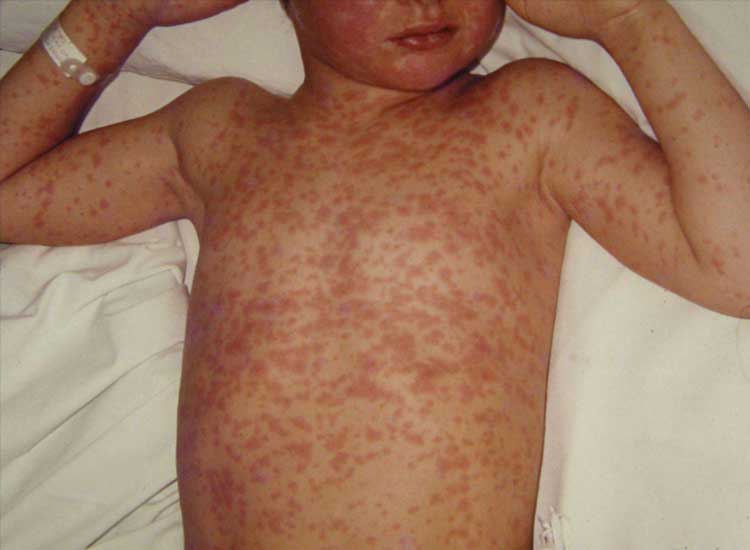What is Measles?
Measles is a highly contagious respiratory tract infection. This disease is characterized by skin rashes all over the body and flu-like symptoms. Measles is caused by a virus that can be transmitted from saliva splashes.
Generally symptoms appear about one to two weeks after the body is exposed to the virus.
This disease most often occurs in children and can be fatal. However, this disease can be prevented by getting the vaccine.
Causes of Measles
Measles is caused by the rubeola virus. The disease spreads through direct contact with people who have the virus or through droplets in the air.
The measles virus is classified as a member of the genus Morbillivirus in the family Paramyxoviridae. Humans are the only natural host for the measles virus.
Viruses enter the body through the mouth, nose or eyes. Once there, it likely enters the lungs, where it infects immune cells.
These cells move to the lymph nodes, where the virus moves to other cells and then spreads throughout the body, releasing viral particles into the blood.
As blood flows throughout the body, it carries the virus to various organs, including the liver, skin, central nervous system, and spleen.
In the skin, the measles virus causes inflammation of the capillaries. This causes the characteristic measles rash.
It takes six to 21 days for measles symptoms to appear after infection.
Sufferers can transmit this disease for about four days, before the rash appears to about four days after the rash appears.
Measles Risk Factors
Generally, this condition more often affects children under five years old.
However, anyone can be infected with the virus. A person is also more susceptible to contracting measles if they have never had the disease or have not received vaccination.
The following are some risk factors for measles:
1. Have not received vaccinations
You are at higher risk of contracting this disease if you have not received the measles vaccine .
2. Travel abroad
If you travel to developing countries, where this condition often occurs, you are at higher risk of contracting the disease.
3. Vitamin A deficiency
People who consume insufficient vitamin A intake are also at risk of experiencing severe symptoms and complications.
Measles Symptoms
The initial symptoms of measles infection usually include a cough with phlegm, runny nose, high fever and red eyes.
Children may also have Koplik’s spots (small red spots with a blue-white center) in the mouth before the rash starts.
The rash will then appear 3–5 days after the initial symptoms begin.
The sequence of appearance of these spots is from behind the ears, around the head, then to the neck. Eventually, the rash will spread throughout the body.
- The following are the symptoms, namely:
- The eyes are red and sensitive to light.
- Resembles cold symptoms such as dry cough, runny nose, and sore throat.
- Weak and tired.
- High fever.
- Aches and pains.
- Not enthusiastic and losing appetite.
- Diarrhea or/and vomiting.
- Small grayish-white patches in the mouth and throat.
For more details, you can read about the symptoms of measles in this article: Mothers, Recognize the 14 Early Symptoms of Measles in Children .
Measles Diagnosis
The diagnosis of measles is determined based on the clinical picture, namely the signs and symptoms experienced by the patient.
However, in special cases, doctors can carry out supporting examinations, such as complete blood tests, antibodies to measles, and liver function.
Examination using reverse transcriptase-polymerase chain reaction (RT-PCR) can also determine a definite diagnosis. However, in most cases, this is not necessary.
Measles Treatment
Because it is caused by a virus, there is no specific medical treatment for this condition. This disease can heal by itself.
To relieve the symptoms, the following treatments can be done:
Drink plenty of water to prevent dehydration.
Get plenty of rest and avoid sunlight as long as your eyes are still sensitive to light.
Take fever-reducing medication and aches and pain relievers.
Measles Prevention
Measles is also known as rubeola. Currently there is a vaccine available to prevent this disease.
The vaccine for this disease is part of the MMR vaccine. MMR vaccination is a combined vaccine for measles, mumps and rubella.
MMR vaccination is given twice. First, it is given when your little one is 15 months old and the next dose of MMR vaccine is given when they are 5-6 years old or before entering elementary school.
Vaccines have quite an important function in preventing measles.
How does the measles vaccine work? When you get the measles vaccine, your immune system will make protective antibodies against the weakened vaccine virus.
That way, if one day you are infected with the virus that causes measles, your immune system can fight the virus attack.
Measles Complications
This disease must be watched out for, even though the number of people suffering from measles complications is not too large.
Complications that can occur due to this disease are:
- Bronchitis.
- Lung infection (pneumonia).
- Inflammation of the ear.
- Brain infection (encephalitis).
- Encephalitis (inflammation of the brain).
- Meningitis (inflammation of the lining of the brain).
- Diarrhea.
- Death.
Link Terkait :


No Responses